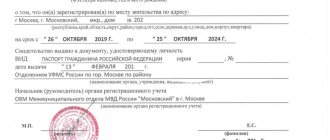Home » Registration of citizens » Law on registration of citizens
June 16, 2020 No comments
Our country has established the obligation of every citizen of the Russian Federation, as well as foreign citizens, to register at their place of residence. In accordance with the law, every citizen must notify government authorities when changing their place of residence.
Rules of law
This obligation is established in the Law of the Russian Federation of June 25, 1993 N 5242-1 “On the right of citizens of the Russian Federation to freedom of movement, choice of place of stay and residence within the Russian Federation.”
The Law on Registration of Citizens at the Place of Residence establishes the right of citizens to live freely on the territory of Russia.
Currently, the procedure for registration at the place of residence or stay, penalties for its violation are regulated by the following legislative acts:
- Law of the Russian Federation of June 25, 1993 No. 5242-1;
- Federal Law No. 376-FZ dated December 21, 2013 “On amendments to certain legislative acts of the Russian Federation”;
- Government Decree No. 713, which approved the Rules for registration and deregistration of Russian citizens at the place of residence and place of stay within the country;
- Administrative regulations for the provision by the Federal Migration Service of the state service of registration of Russian citizens at the place of residence and place of stay within the country, which was approved by the Order of the Federal Migration Service of Russia dated September 20, 2007. No. 208;
- Letter from the Federal Migration Service of the Russian Federation dated April 1, 2011. No. SK-1/10-4222 “On some issues of registration of citizens of the Russian Federation”;
- Code of Administrative Offenses of the Russian Federation (Article 19.15);
- Article 322.2 of the Criminal Code of the Russian Federation.
Procedure for registering citizens of the Russian Federation at their place of residence
The procedure for registering citizens at their place of residence is regulated by several laws:
- Constitution of the Russian Federation;
- Housing Code of Russia;
- A legislative act regulating the right of citizens to freedom of movement throughout the country;
- Registration Law;
- Russian regulations stipulating the rules for registration and the rules for deregistration.
According to the provisions of the new law on registration, the procedure for registering citizens at their place of residence is as follows:
- Initially, you need to draw up an application in which you indicate a request for deregistration from the previous registration address;
- The following is the deregistration procedure. You need to come to a specialized government agency with a collected package of documents, on the basis of which a departure slip will be drawn up;
- After receiving the disposal sheet, you must fill out a registration form (on your own or with the help of a FMS employee);
- Now you need to submit a package of documents for registration at your new residential address. In addition to submitting papers, all family members over 14 years of age are required to appear at the passport department. If all submitted documents are properly prepared (in accordance with the law), then the FMS employee accepts and certifies them. According to the law, after the certification procedure, the package of papers is transferred to the head of the department. It is up to the boss to decide how long the documents will take to be ready;
- One of the family members who is participating in the process of re-registration at a new place of residence has the right to come for the completed papers. All documents are issued against the signature of the recipient.
Read 7-FZ “On Environmental Protection”
Registration period
According to the provisions of the Federal Law “On the right of citizens of the Russian Federation to freedom of movement, choice of address and residence within the Russian Federation”, to carry out the registration process at a new place of residence, you can contact:
- to the FMS office;
- to the Internet portal of State Services;
- to the department of the Ministry of Internal Affairs, replacing the FMS;
- to multifunctional centers;
- to the management company at the place of registration;
- to the passport office.
Each citizen chooses the authority for submitting documents independently. According to the provisions of Federal Law No. 5242-1, officials of the registration authority are obliged within three working days .
Required documents
Article 6 of the Law of the Russian Federation on the registration of citizens of the Russian Federation contains a list of papers required to carry out the process of re-registration from one residential premises to another.
List of required documents:
- Statement;
- Identification;
- Papers confirming the rights to residential premises (house, apartment). For example, a lease contract or a document indicating ownership;
- Retirement sheet;
- Arrival sheet;
- Permission for registration (permission is required if the citizen is not the owner of the property).
By law, the application must contain information:
- Name of the institution to which the application is submitted;
- Full name of the applicant;
- Full name of the property owner;
- Grounds for registration in this residential premises;
- Address of new housing;
- Applicant's passport details;
- Date of eviction from previous residential address;
- Homeowner's signature.
Applications can be found here.
Registration rules
Government Decree No. 713 dated July 17, 1995 approved the Rules for registration and deregistration of Russian citizens at their place of residence and temporary stay in Russia and officials responsible for receiving the necessary documents from the migration service.
Registration varies in duration; it can be permanent or temporary.
Permanent registration, in accordance with the law, can be issued in a living space that belongs to a citizen by right of ownership or is occupied on the basis of a social contract. hiring All citizens must be registered in the place of their actual residence on a permanent basis.
The place of temporary stay may be a hotel, hostel, sanatorium or other recreational institution. Temporary registration is also issued in places of deprivation of liberty and places of military service.
Temporary registration can be issued in a rented apartment, apartments or living quarters of relatives.
Temporary registration periods
The obligation of temporary registration arises if a citizen moves from his place of residence for more than 90 days. In case of living in a residential premises for longer than the established period without registering, administrative penalties in the form of a fine (from 2 to 5 thousand rubles according to Article 19.15.1 of the Code of Administrative Offenses of the Russian Federation) may be applied to violators.
Recently, changes have been made to the registration law.
The amendments made to the Federal Registration Law are as follows:
- Temporary registration is also issued for persons serving sentences in correctional institutions;
- The term “fictitious registration” was introduced, which means that a person does not live at the place of his actual residence;
- Criminal liability has been established for carrying out fictitious registration of citizens of the Russian Federation, foreign citizens, as well as stateless persons. A corresponding article was included in the Criminal Code of the Russian Federation (Article 322.2 of the Criminal Code of the Russian Federation);
- If the rules of registration at the place of stay or place of permanent residence are violated, administrative sanctions are provided.
Law on registration, rules and laws on registration at the place of residence and stay
- Documents issued by state or local authorities, on the basis of which rights to real estate arise and terminate;
- Agreements concluded between individuals and legal entities;
- Decisions on privatization of objects;
- Judicial decisions that have received legal force;
- Evidence of the right to inherit the object.
We recommend reading: Are there scholarships for paid workers?
The law on registration at the place of residence in the country has not been adopted. However, Government Decree No. 713 of July 17, 1995 is currently in force, which regulates the procedure for entering information about a person’s residence in a specific residential premises.
Procedure for registration at the place of residence
To obtain temporary registration at your place of stay, you can contact the following institutions:
- Federal Migration Service;
- Multifunctional center for the provision of services to the population (MFC);
- Passport office at the Criminal Code, Housing Department;
- Through the State Services Internet portal (you must first log in to the website).
The above-mentioned government bodies verify the documents submitted by the applicant. In addition to the application in the prescribed form (No. 6 for citizens, No. 9 for foreigners), identification documents, a child’s birth certificate (if necessary), and a power of attorney from a representative are provided.
If a person registers in an apartment that is privately owned, written consent from its owner is required.
In the case of moving into municipal housing, you must obtain permission from all persons living in the living space, including those who are absent for various reasons.
How long can temporary registration last?
The duration of temporary registration can range from several weeks to 5 years, it all depends on the specific case.
The Registration Law establishes a rule according to which, after the expiration of the temporary stay period, with the consent of the home owner, such registration can be extended.
There is no state fee for completing the registration procedure for Russian citizens. For foreign citizens, the state duty is 350 rubles.
You can apply for a registration certificate in person or receive it by mail. For temporary registration, you do not need to be discharged from your previous place of residence (permanent).
When is it possible to prescribe temporarily?
You should register temporarily if a person leaves his usual home for more than three months. It is impossible to be without registration for a longer period, and violations are covered by the penalties described in the Federal Law.
Over the past few years, amendments have been made to the new law on registration .
This is interesting: Is it possible to live at a location other than the place of registration? What is registration address and registration address?
Amendments made to the current Federal Law on registration and registration:
- People in prison and serving their sentence can also register temporarily. They can apply for registration at the relevant institutions;
- the concept of “fictitious registration” was introduced, meaning illegal registration and registration based on inaccurate information;
- criminal penalties have been introduced for carrying out fictitious registration;
- administrative liability has been introduced for committing any offenses in the registration procedure;
- implementation of penalties applied to people without timely registration.
Features of permanent registration
Registration at the place of residence must be completed after a change of permanent place of residence, for example, when moving to a new apartment. Registration is carried out by the same government bodies as for temporary registration.
To obtain registration at the place of residence, a citizen must prepare a passport, title documents for residential premises (extract from the Unified State Register of Real Estate) or an apartment rental agreement, an extract from the house register. If an application is submitted by a representative of the applicant, a notarized power of attorney confirming his authority will be required.
How long can you stay without permanent registration?
Within 7 days after changing the address, a citizen is required to go through the registration procedure.
Registration will require a period of 3 to 5 days. Documents can be submitted through the State Services Internet portal, but you will need to come to the migration service department (MFC) to put a mark in your passport or receive a registration certificate.
A preliminary extract from the previous place of residence is currently not required, as was previously the case. Currently, there is a “one-stop shop” system in place, which means that the applicant can receive and issue documentation for the implementation of a state or municipal service as a result of a one-time application with a specific request.
Thus, the procedure for registering citizens, as a rule, is completed quickly and without any problems.
Supervision of compliance with registration rules
Employees of the Migration Service and the Ministry of Internal Affairs of the Russian Federation have the right to decide to conduct checks of citizens' compliance with the registration rules established by law.
Based on the results of the inspection, an Inspection Report is left. If violations of the registration rules are detected, the official initiates administrative proceedings or forwards the material to the competent government body, which is authorized to make decisions after the discovered violation.
In addition, control over compliance by Russian citizens with the registration procedure is carried out by local police officers at the address.
Responsibility in case of violations of the rules
Administrative liability for violation of registration rules in relation to citizens is enshrined in Art. 19.15.1 Code of Administrative Offenses of the Russian Federation:
In accordance with it, an administrative fine for violation is established in the amount of 2 to 5 thousand rubles.
In Art. 19.15.2 of the Code provides for liability in relation to officials who are responsible for registration, as well as property owners:
- for officials - from 25 thousand to 50 thousand rubles;
- for owners of residential premises (individuals) - from 2 thousand to 5 thousand rubles.
The powers to consider cases of bringing to administrative liability are:
- Heads of territorial departments of the migration service, their deputies;
- Police officers.
How to register a minor child without the consent of the owner of the premises, see here.
Video: Putin’s new Decree of 06/08/2020. on registration of foreign citizens:
(No Ratings Yet)










